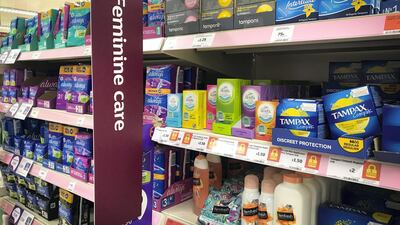Britain abolished the “tampon tax” on Friday, with a zero rate of VAT applied to women’s sanitary products from midnight, as the government implemented one of its first legislative changes since exiting the European Union.
With the UK no longer subject to the EU VAT directive, it now has the freedom to drop the mandated 5 per cent tax on all sanitary products. The move is part of a wider government initiative to end “period poverty” in Britain, which includes supplying free sanitary products in schools, colleges and hospitals.
“Sanitary products are essential so it’s right that we do not charge VAT,” said UK finance minister Rishi Sunak on Friday.
“We have already rolled out free sanitary products in schools, colleges and hospitals, and this commitment takes us another step closer to making them available and affordable for all women.”
Period poverty, a collective term used to describe the inability to afford or procure sanitary supplies, is often associated with poorer countries, but women in wealthier nations can also struggle to buy them.
In the UK, the average woman spends about £4,800 ($6,556) on the products over her lifetime, according to a 2018 study commissioned by menstrual cup brand Intimina, an amount that rises for people with medical conditions such as endometriosis.
Period poverty can cause girls and women to miss school or work due to embarrassment over not being able to afford protection.
Some countries have already scrapped the tax, including Kenya which was the first to make the move in 2004, followed by Australia, Canada and Ireland.
However, many nations still tax period products, with some even treating them as luxury goods and applying similar tax rates to those on cigarettes, alcohol, and jewellery.
The 2020 tax rate on menstrual products was 27 per cent in Hungary, 25 per cent in Sweden, and 16 per cent in Mexico. In the US, 30 states levy a sales tax on tampons and pads, according to advocacy group Period Equity.

Mr Sunak first pledged to cut the tampon tax in his March 2020 budget, a move only made possible by the end of the Brexit transition period on Thursday and the UK securing freedom from the EU law mandating VAT on sanitary products.
Last year, free period products were rolled out to all state schools and colleges in England, Scotland and Wales, and were made available to all NHS patients.
The government also set up the Tampon Tax Fund in 2015 to allocate money generated from VAT on sanitary products to projects supporting vulnerable women and girls.
Scotland went a step further in November when it made products such as tampons and sanitary pads freely available to anyone who needs them. Local governments must ensure free supplies are provided in public buildings such as libraries and recreation centres.
The Scottish government said that about 13 per cent of people who have periods will benefit from the programme in its first year. That would put costs, which it will cover, at about £8.7 million for 2022-23.
Meanwhile, Northern Ireland received executive approval to provide free period products to all schools in December, after education minister Peter Weir pitched a paper on period poverty. The scheme will go into force by September 2021.
Felicia Willow, chief executive of the Fawcett Society, a British women's rights charity, welcomed the UK's VAT cut. “It's been a long road to reach this point,” she said, “but at last the sexist tax that saw sanitary products classed as non-essential, luxury items can be consigned to the history books.”


